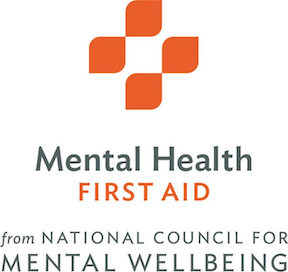
Mental Health First Aid (MHFA) is a skills-based training that teaches people how to identify,
understand and respond to signs and symptoms of a mental health or substance use challenge in adults ages 18 and over.
The evidence behind the program demonstrates that it builds mental health literacy, providing an action plan that teaches people to safely and responsibly identify and address a potential mental health or substance use challenge.
Complete to form below to submit your registration request. Upon receipt of your registration submission, you will receive a follow up email to submit your payment.
Each session is $115 per person.
MHFA FAQs
What is Mental Health First Aid (MHFA) and what does it teach?
- MHFA is skills-based training that teaches people how to identify, understand and respond to signs and symptoms of a mental health or substance use challenge.
- Similar to physical First Aid and CPR, MHFA helps you assist someone experiencing a mental health or substance use crisis until professional assistance is obtained or the crisis is resolved.
- Mental Health First Aiders learn a 5-step Action Plan to recognize warning signs of a mental health or substance use challenge, provide help in crisis and non-crisis situations and
understand where to turn for additional assistance.- The 5-step Action Plan (ALGEE) is: Assess for risk of suicide or harm; listen
nonjudgmentally; give reassurance and information; encourage appropriate professional help; and encourage self-help and other support strategies.
- The 5-step Action Plan (ALGEE) is: Assess for risk of suicide or harm; listen
- Through MHFA, more than 3 million people in the U.S. have been trained by thousands of certified Instructors to identify, understand, and respond to signs and symptoms of mental health and substance use challenges.
- Peer-reviewed studies have proven that trained Mental Health First Aiders are more
knowledgeable and confident when it comes to identifying and helping an individual in distress. - The new MHFA curriculum gives First Aiders working definitions for trauma and post-traumatic stress disorder (PTSD). It describes the types of crises associated with trauma and emphasizes the importance of early intervention following a traumatic event. First Aiders receive clear guidance for supporting someone immediately after a traumatic event, as well as over the time that follows. This added instruction on trauma will help First Aiders better assess and respond to situations where they encounter someone dealing with trauma related to COVID-19 or other events.
- The MHFA curriculum helps First Aiders understand what self-care is and the various forms it can take. The curriculum demonstrates how self-care is important to resilience and recovery, and then helps First Aiders develop their own self-care action plans that they can use to navigate traumas and stressors.
How do we know MHFA is effective?
Many people know to call 911 or administer CPR for a physical health emergency but hesitate
to start conversations about mental health and substance use. MHFA provides the tools a
layperson needs to take action.
- Studies show that MHFA training reduces stigma, improves knowledge and increases first aid actions toward people experiencing mental health and substance use challenges.
- MHFA is proven to be effective in teaching adults how to recognize and respond to signs and symptoms of mental health and substance use challenges. Peer-reviewed studies from around the world show that individuals trained in MHFA:
- Expand their knowledge of signs, symptoms and risk factors of mental health and substance use challenges.
- Can identify appropriate types of professionals and self-help resources for individuals with a mental health or substance use challenge.
- Have increased confidence in and likelihood to help an individual in distress.
- Show increased mental wellbeing themselves.
